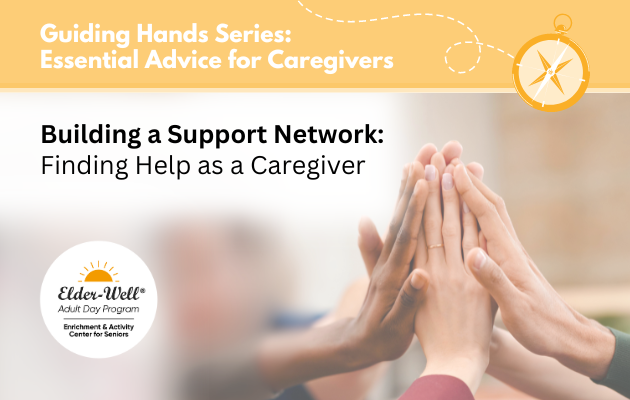Building a Support Network: Finding Help as a Caregiver

Guiding Hands Series: Essential Advice for Caregivers
Caring for a loved one with Alzheimer’s or other progressive disease can be an isolating experience. The demands of caregiving often leave little time for socializing, self-care, or even asking for help. Yet, one of the most important aspects of being an effective caregiver is recognizing that you don’t have to do it alone. Building a strong support network is essential not only for your well-being but also for providing the best possible care to your loved one. In this blog, we’ll explore the importance of a support network, how to build one, and where to find the help you need.
Why a Support Network is Crucial
Caregiving can be physically, emotionally, and mentally exhausting. Without a support network, caregivers are at a higher risk of experiencing burnout, depression, and feelings of isolation. A support network can provide:
- Emotional Support: Having people to talk to who understand what you’re going through can be incredibly comforting. Whether it’s family, friends, or other caregivers, sharing your experiences and emotions can help alleviate the stress of caregiving.
- Practical Assistance: A support network can help with day-to-day tasks, giving you much-needed breaks. This assistance can range from helping with household chores to providing respite care.
- Information and Resources: Connecting with others who have experience in Alzheimer’s caregiving can provide you with valuable insights, tips, and resources that you might not have discovered on your own.
- Validation and Encouragement: Sometimes, all you need is to hear that you’re doing a great job. A supportive network can offer encouragement and remind you that you’re not alone in this journey.
Steps to Building a Support Network
- Start with Family and Friends: Reach out to those close to you. Let them know what you’re going through and ask for their support. Be specific about the kind of help you need, whether it’s someone to talk to, assistance with caregiving tasks, or help with errands.
- Join a Support Group: Support groups for caregivers can be incredibly beneficial. These groups provide a safe space to share your experiences, ask questions, and learn from others who are facing similar challenges. You can find support groups in person or online, making them accessible no matter where you are.
- Connect with Professional Caregivers: If you’re feeling overwhelmed, consider enlisting the help of professional caregivers. Home health aides, respite care providers, and adult day care centers can offer relief and ensure that your loved one receives the care they need when you need a break.
- Seek Out Community Resources: Many communities have resources specifically designed to support caregivers. These can include local Alzheimer’s associations, community centers, and religious organizations. Don’t hesitate to reach out to these groups for help.
- Use Online Resources and Forums: The internet is full of resources for Alzheimer’s caregivers. Online forums, social media groups, and caregiver websites can provide a wealth of information, as well as a virtual support network. These platforms allow you to connect with others from the comfort of your home, making it easier to find support even if you can’t leave the house.
- Don’t Be Afraid to Ask for Help: It’s common for caregivers to feel like they should be able to handle everything on their own. However, asking for help is a sign of strength, not weakness. Whether it’s reaching out to family, friends, or professionals, don’t hesitate to ask for the assistance you need.
- Consider Counseling or Therapy: Sometimes, talking to a professional can provide the support and guidance you need to manage the emotional challenges of caregiving. A counselor or therapist can help you process your feelings and develop coping strategies.
Finding Help When You Need It Most
The key to building a strong support network is to start early and be proactive. Waiting until you’re overwhelmed can make it harder to reach out for help. Here are some places to start:
- Alzheimer’s Association: The Alzheimer’s Association offers a wealth of resources for caregivers, including support groups, educational programs, and a 24/7 helpline.
- Local Senior Centers: Many senior centers offer programs and services specifically for caregivers, including respite care, educational workshops, and support groups.
- Faith-Based Organizations: Churches, synagogues, and other religious organizations often provide support to caregivers through counseling services, volunteer programs, and community events.
- Online Communities: Websites like the Alzheimer’s Association, ALZConnected, AgingCare, and Caregiver Action Network offer online forums and resources where you can connect with other caregivers and find support.
The Power of Connection
Building a support network as a caregiver is about more than just getting help—it’s about finding a community of people who understand what you’re going through. By connecting with others, you’ll not only lighten your load but also gain the strength and resilience needed to continue on this journey.
Remember, you don’t have to do this alone. There are people and resources available to support you every step of the way. By reaching out and building a strong support network, you can ensure that both you and your loved one receive the care and support you deserve.
